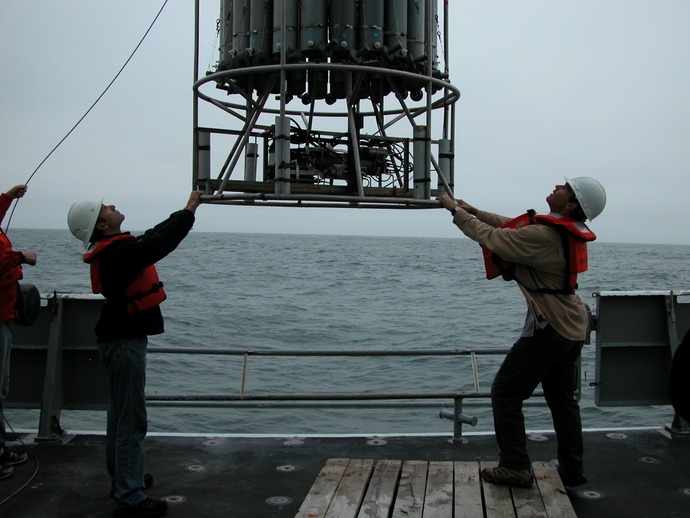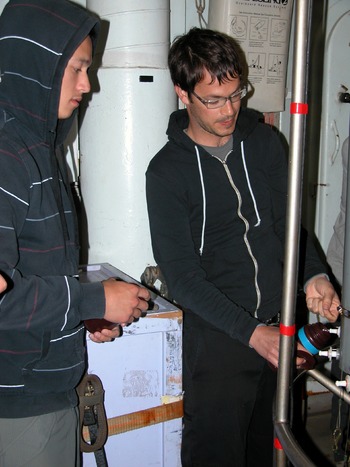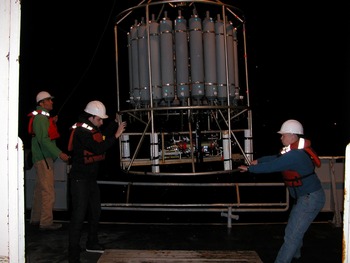these words might encourage others to consider that oceanographic research, though seemingly remote, is actually within the grasp of the truly curious and motivated individual and relevant to all of us on planet earth.
Upon reading the “First Impressions” perspectives found on the July 27 Enlighten’10 Daily Log, I felt an immediate kinship with the students aboard the R/V Thomas G. Thompson. The statements made by Derek, Ann, and Sam struck a chord with me – they have expressed many of the same sentiments I have felt on my various excursions as an offshore surveyor over the years. I thought it fitting for me to provide my perspective as a sort of reinforcement of their expressions of intimidation, awe, and excitement with the hope to allay any reservations that might still exist in their minds. Perhaps these words might encourage others to consider that oceanographic research, though seemingly remote, is actually within the grasp of the truly curious and motivated individual and relevant to all of us on planet earth.
My function on this cruise is as a Marine Technician – a position sort of between ship’s crew and science party, performing tasks ranging from carpentry to computer support to deck operations. This is my first chance to work in such a capacity, though I have accumulated over 1200 days at sea as an offshore surveyor in the past 13 years. Granted, there are offshore surveyors half my age with double the number of days at sea, so I don’t consider myself a hardened offshore veteran. I really am a newcomer to this realm of research oceanography.
For the first few days aboard ship I too felt an overarching sense of “being surplus to requirement” as Sam Monk so eloquently wrote in his entry on the July 27 Daily Log. Thankfully, the other two Marine Technicians I am working with have a wealth of experience providing support to oceanographic researchers in a setting such as this, which makes my first foray into this realm less daunting. Each of my shipmates – students, scientists, video crew, ship’s crew, and marine technicians – brings with them a genuine, heartfelt joy for their particular bailiwick. It truly is a joy to witness people doing what they love most. The daily excitement for our collective tasks is contagious. I find myself happily spending time beyond my 12-hour shift posing questions to members of each team to help satisfy my unending curiosity. All of them, without exception, have been eager to explain to me, in easy-to-understand terminology, exactly what they are involved with on this particular cruise. The camaraderie, scientific curiosity, and competency I am witnessing here aboard the R/V Thomas G. Thompson are unlike anything I have seen before in my 13 years as an offshore surveyor.
John Delaney, the lead scientist for this cruise, gave a presentation in the ship’s library several days ago. I took from that lecture a renewed sense of just how much life upon terra firma is affected by ocean processes…most notably, weather (climate) and food production. The research being performed on this cruise is but a stepping stone into a deeper understanding of the life-support system on spaceship earth. The better we understand how our lives depend on planetary-wide ocean influences, the better equipped we will be to proceed into a sustainable future here on the only planet we have available to us. No single person on this cruise (or reading this blog entry) is “surplus to requirement." We all have a job to do in the pursuit of genuinely understanding the world around us, whether we are on the leading edge of scientific inquiry, supporting those scientists, or making an honest effort to make our own domain more livable. I count my blessings to be so close to the action on what my father dubbed as a “class act”.
Chris Pinero
August 1, 2010




